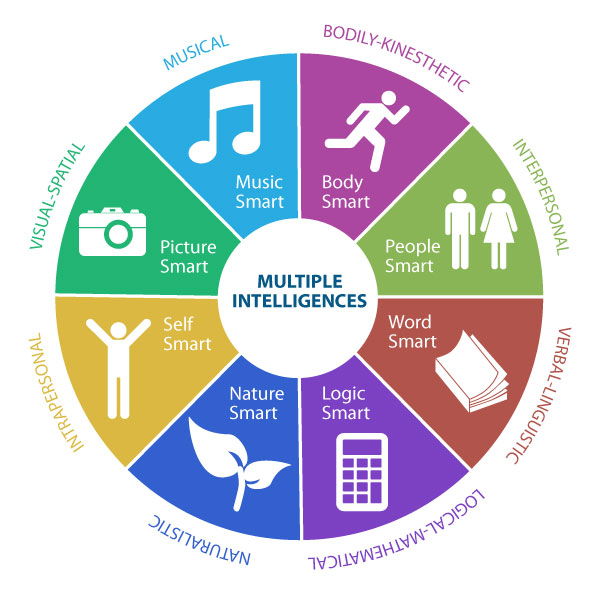9 Your Learning Skills and Strengths
You are Smart!
Everyone can learn and we all do it slightly differently. There are at least eight ways of approaching problems and making things. These eight intelligences are simple and powerful tools to understand and use your learning.[1]
|
Intelligence |
Abilities |
|
Word smart |
The capacity to use language to express what’s on your mind and to understand other people. People who are high in this intelligence are sensitive to language, meanings, and the relationship of words. They engage easily with vocabulary activities, grammar, poetry, essays and plays. |
|
Number smart – Logical/ Mathematical Intelligence |
People with a highly developed logical/mathematical intelligence understand the underlying principles of many kinds of system; or can manipulate numbers, quantities, and operations. Abstract thinking, counting, organizing; and logical structures are preferred by people high in this intelligence. They also like critical thinking activities, breaking ideas into smaller parts and reassembling them. |
|
Picture smart |
The ability to represent the spatial world internally in your mind. Spatial intelligence can be used in trades, sciences, and the arts. These people tend to be keen observers, able to think in three dimensions, and like to use metaphors. Learning materials that work well for them include: graphs, charts, colour codes, guided imagery, pictures, posters, and mind maps. |
|
Body smart |
The capacity to use your whole body or parts of your body – your hands, your fingers, your arms – to solve a problem, make something, or put on some kind of a production. These people have good body control and fine motor skills; and are often active and animated. They need “hands-on” learning opportunities, like shop, labs, games, and performance. |
|
Music smart – Musical Intelligence |
The capacity to think in music, to be able to hear patterns, recognize them, remember them, and perhaps manipulate them. People who have a strong musical intelligence don’t just remember music easily – they can’t get it out of their minds. These people will be sensitive to rhythm, pitch, intonation, and can remember tunes and rhythms easily. They tend to like poems, plays, chants, music, songs, and musically guided stories. |
|
People smart |
Understanding other people. Anybody who deals with other people has to be skilled in the interpersonal area. This is a social intelligence and those who are high in this area are outgoing and interactive; sensitive to others’ moods, feelings, and motivations |
|
Self smart |
Having an understanding of yourself, of knowing who you are, what you can do, what you want to do, how you react to things, which things to avoid, and which things to gravitate toward. They tend to know what they can do. They tend to know what they can’t do, and they also tend to know where to go for help. |
|
Nature smart – Naturalistic Intelligence |
The ability to discriminate among living things (plants, animals), sensitivity to other features of the natural world (clouds, rock configurations) as well as a good sense of their surroundings and environment. They are also sensitive to changes around them, both outdoors and indoors. |
You have all of these intelligences, but some of them are stronger than others.
By using them you strengthen them and increase your ability to do more in the future.

How are you smart?
List at least one way you use each of these intelligences.
- Interpersonal
- Intrapersonal
- Linguistic
- Logical/mathematical
- Naturalist
- Spatial
- Bodily/kinesthetic
- Musical
- Adapted from http://www.ascd.org/ and http://www.ncsall.net/ ↵

